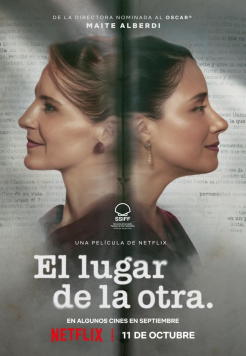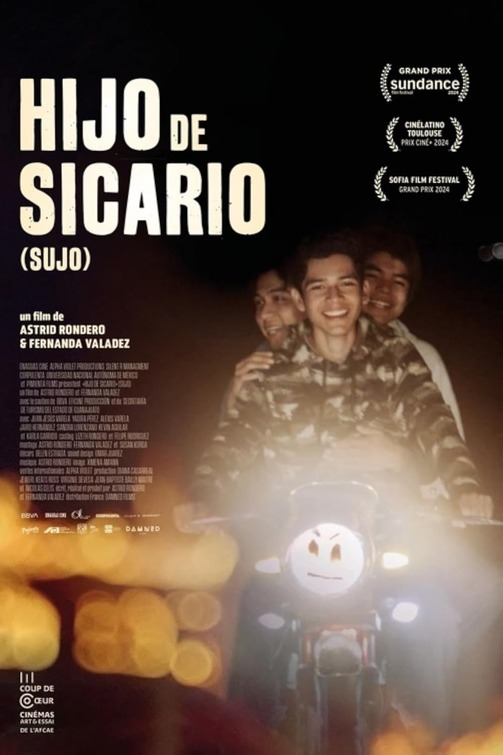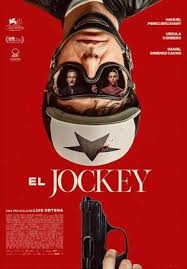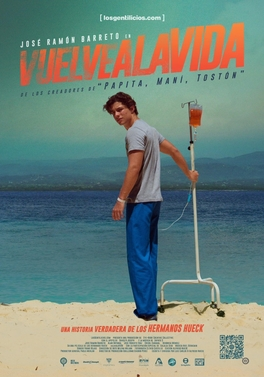So this year, I’ve been fortunate to see almost half the submitted films in this category (47 out of 89), which is a record for me before the shortlist. Getting more screeners means taking more time to watch them so I'm admittedly running a bit behind....
Today, I’ll be doing a rundown of the 17 films submitted from
the countries of North and South America, including the two which appear to have
been disqualified.
Over the past five years, films from the Americas only
earned a single Oscar nomination ( “Argentina 1985”) but they’ll
definitely get a nomination this year, with two frontrunners for the shortlist,
including Brazil which has the best reviews of any International film this year. It's the only film with a chance to win the Oscar away from French frontrunner “Emilia
Perez”.
Here is a rundown of the 17 films submitted from the
Americas:
Number of Countries Participating this year: 17
Number of Films Found Eligible: 15
Number of Countries That Have Participated in the
Past: 22
Who’s Missing?: Of the five missing countries,
only CUBA was slightly surprising. Cuba only sends films to the Oscars
roughly half the time but they did hold an open competition for the Goyas,
selecting “Wild Woman” over two other films. I have no idea why they didn’t just
send the same film (which looks great) to the Oscars.
PUERTO RICO was officially banned from the Oscars by
AMPAS in 2010 (ridiculous!) and are no longer invited to send films. The other three
countries didn’t seem to have any viable contenders. HONDURAS and SURINAME
last sent films in 2020 and NICARAGUA in 2010.
FRONTRUNNERS:
1. ![]() BRAZIL- “I’m Still
Here” (4.4)
BRAZIL- “I’m Still
Here” (4.4)
2. ![]() CANADA-
“Universal Language” (3.8)
CANADA-
“Universal Language” (3.8)
First of all, “I’m Still Here” (from BRAZIL) is the closest thing to a
lock this year. It has everything going for it...It's gotten wonderful reviews, festival play and has been a hit with both critics and audiences. It's by a respected international director who has worked in Hollywood. More importantly, it has serious buzz and got a limited U.S. release in New York and Angeles. And while it's probably not a serious contender for Best Picture or Best Actress, it is being talked about. So Oscar voters in this category will definitely be watching this film which is the main thing that matters. For those of you who don't know, "I'm Still Here" is the true story of a woman who becomes a political activist after the Brazilian military dictatorship arrests her husband....who is never seen again. While I haven't seen it yet, it's said to be devastating and emotionally uplifting and presses all the right buttons. It's in (and I think it has the ability to beat "Emilia", which is not doing well with critics at the moment).
I also believe that we'll see CANADA on the December 17th shortlist. "Universal Language" is a weird little film set in an alternate universe Winnipeg (the capital of the Anglophone province of Manitoba in real-life) where the city is almost entirely Persian-speaking. Telling a series of seemingly unrelated little stories, "Universal Language" is a quirky film that has (quite naturally) been compared to Iranian cinema despite having a white Anglophone director (from Winnipeg, of course). The film will be released in U.S. cinemas in early 2025 which will help the film make the Top 5 if and only if it makes the shortlist. I think enough people are buzzing about it to get it there. Between 2006-2012, Canada got four Oscar nominations and two shortlist spots but they've only managed a single mention since then ("Juste la fin du monde", Xavier Dolan's weakest effort....). I think "Language" will help them end their Oscar drought.
DARK HORSES:
These three countries will be praying for a miracle.
3.
In A Nutshell: A shy secretary begins to secretly spend time in the luxury apartment of a murder suspect.
Pros: The backing of Netflix and the name recognition of two-time Oscar nominee Maite Alberdi. "In Her Place" is a beautifully made period drama that gently explores gender dynamics, tabloid media and women's empowerment. But the improbable murder case in the background (which, shockingly, is based on a true story) is much more interesting than the story of Mercedes, our sweet but unassuming heroine.
Cons: Reviews have been positive but mostly unenthusiastic. It's good but certainly not one of the 15 best films on the list but there's always one high-profile film on the shortlist that seems to get there via name recognition and not reviews ("Sujo" will also be fighting for that slot, though less people have probably seen that one).
4. ![]() GUATEMALA- “Rita” (Letterboxd: 3.4)
GUATEMALA- “Rita” (Letterboxd: 3.4)
In A Nutshell: A 12-year old runaway girl is sent to an orphanage that more closely resembles a prison, replete with ghosts, gangs and corruption.
Pros: This is a visually stunning film by a previously shortlisted director, with strong performances and a shocking finale.
Cons: It's a tough film to watch. Jayro Bustamente's "La Llorona" was a smaller-scale film, but it had a lot more buzz surrounding it than the low-profile "Rita". The supernatural/horror elements are the strongest aspects of the film....yet those are exactly the elements that Oscar voters don't usually go for.
5. ![]() MEXICO- “Sujo” (3.5)
MEXICO- “Sujo” (3.5)
In A Nutshell: A boy grows up with his single mother in Mexico's Michoacan state, surrounded by drug cartel-related violence, before fleeing to the city where he dreams of going to school
Pros: Mexico has strong support among Oscar voters; they've been shortlisted five of the past six years (sadly, the only film that wasn't shortlisted- "The Chambermaid" - was my favorite film of the six) and "Sujo" has fairly good reviews.
Cons: I didn't really like "Sujo" though I can't really put my finger on why. Lots of Mexican drug cartel cliches?....White savior complex?....Annoying ending?
MIDDLE OF THE PACK:
6. ![]() COSTA RICA- “Memories of a Burning Body” (Memorias de un cuerpo que arde) (3.9)
COSTA RICA- “Memories of a Burning Body” (Memorias de un cuerpo que arde) (3.9)
7. ![]() ARGENTINA- "El jockey” (3.5)
ARGENTINA- "El jockey” (3.5)
8. ![]() PERU- “Yana Wara” (3.8)
PERU- “Yana Wara” (3.8)
9. ![]() BOLIVIA- “Mano propia” (approx. 3.5)
BOLIVIA- “Mano propia” (approx. 3.5)
Let's start with the two films I've seen- COSTA RICA and PERU. "Memories of a Burning Body" is an an original and daringly feminist film featuring a series of actors re-enacting scenes narrated by a series of real-life (and unseen) elderly Costa Rican women narrators who talk about their experiences growing up in conservative families, discovering sex, masturbation and cheating husbands, and achieving personal fulfillment in old age. The actors on screen merge this in a loose but fairly clear narrative, with a minimum of dialogue. This is a film with an odd structure that won't appeal to everyone but it should make Costa Rica proud. For me, it was a tremendously educational experience even if I didn't absolutely love watching the film. It's a film that makes you think about the grandmothers and other women in your life, and it may have had a chance if it came from a bigger country.
"Yana Wara", from PERU, has a tremendously sad backstory. 34-year old indigenous filmmaker Oscar Catacora died at the age of 34 after suffering a medical emergency in the remote rural area where he was making the film. His uncle finished the film after his death. "Yana Wara" is a B+W Aymara folktale about a mute young girl murdered by her grandfather. While on trial in his indigenous community, the grandfather explains the family's tragedy and why he killed his beloved granddaughter. This is an anthropologically important film exploring folklore and misogyny....but it's also extremely old-fashioned in its filmmaking. I would have guessed it was made in the 1950s, and not just because it's in Black and White. I don't think it will appeal to this committee but it's a strong additional to Latin American indigenous cinema.
Unfortunately, I didn't get a chance to see the films from ARGENTINA or BOLIVIA, and I don't know too much about them.....although they look right up my alley. ARGENTINA has sent dark comedy-thriller "El jockey" that most reviews indicate isn't for everyone...but that definitely has its fans. BOLIVIA's "Mano propia" is about the politically charged issue of lynchings and vigilante justice, told from three different points of view. These are two films that I've avoided reading much about because I'm looking forward to seeing them myself without knowing too much of their stories.
HIGHLY UNLIKELY:
10.
11. ![]() ECUADOR- "Behind the Mist" (Al otro lado de la niebla) (approx. 3.3)
ECUADOR- "Behind the Mist" (Al otro lado de la niebla) (approx. 3.3)
12. ![]() COLOMBIA- “La suprema” (3.5)
COLOMBIA- “La suprema” (3.5)
I've seen all three of the films in this group. Based on a true story, "Back to Life" from VENEZUELA is a great comedy-drama that starts off as a teen comedy before quickly changing tack and becoming a riveting medical drama. I was fortunate enough to see a screening with the two directors who based the film on their own lives, when the older of the two fun-loving, wealthy teenaged brothers was diagnosed with a rare form of cancer. This is a deserving film though I'm not certain that enough voters will make it past the more comic first third of the film. While it occasionally strays into telenovela territory, this is a tremendously inspiring film.
ECUADOR's Himalayan documentary "Behind the Mist" is also inspiring for different reasons....and unless you're a mountain climber somewhat less relatable. "Behind the Mist" follows Sebastian Cordero- probably the country's most famous film director - on a climbing expedition through Nepal with 65-year old Ivan Vallejo, the first Ecuadorian to climb Mount Everest. The film made me want to visit Nepal....and never ever go mountain climbing. Also very well done, though I can't remember too much about it.
COLOMBIA has sent lightweight village drama "La Suprema", about an Afro-Colombian village girl from a community so remote it was literally erased from national maps, who aspires to be a champion boxer. After learning that her estranged uncle will compete in a national championship, she and her impoverished community launch a desperate attempt to get a television to watch the match on TV. This is a rather slight film that sometimes works as a comedy of errors but which is fairly amateurish and predictable in its storytelling. I found the main character somewhat irritating.
BETTER LUCK NEXT YEAR:
13. ![]() DOMINICAN REPUBLIC-
“Aire: Just Breathe” (approx. 2.6)
DOMINICAN REPUBLIC-
“Aire: Just Breathe” (approx. 2.6)
14. ![]()
URUGUAY- “The Door is
There” (Hay una puerta ahí) (approx. 3.9)
15. ![]() PARAGUAY- “The Last” (Los
ultimos) (approx. 3.4)
PARAGUAY- “The Last” (Los
ultimos) (approx. 3.4)
16. ![]() PANAMA- “Wake Up Mom” (Despierta
mama) (approx. 2.8)
PANAMA- “Wake Up Mom” (Despierta
mama) (approx. 2.8)
17. ![]()
HAITI- “Kidnapping Inc.”
(3.3)
As always, I want to say that I’m happy these countries took
the time to enter the race…I love seeing all the films. While HAITI and URUGUAY
were disqualified, they were not likely to get very far anyway. “The Door
is There” is a documentary largely consisting of Zoom calls between a terminally
ill Uruguayan man in Montevideo and a Spanish doctor during the pandemic. The
man is seeking authorization to end his life. It’s a fascinating philosophical exercise
between two wonderfully intelligent men (of course, I immediately sided with
the Uruguayan) but it only moderately works as a film. Haiti’s “Kidnapping Inc.”
is an action-comedy-thriller that was made against all odds amidst civil unrest
in Haiti (and in which actual crew members were allegedly kidnapped) but I’ve
heard it’s entertaining but messy. However, I’m excited to see it.
Like Uruguay, the documentary from PARAGUAY works
more as a philosophical treatise than a film. It follows two aging
environmentalists- one German, one Paraguayan- on a road trip around areas of
Paraguay devastated by fires and other natural disasters, who discuss their
views on socialism and lament the lack of adequate environmental protection.
I haven’t seen the films from the DOMINICAN REPUBLIC and PANAMA but they don’t have very good reviews, with “Aire” ranked dead last in user ratings on both IMDB and Letterboxd…not exactly a good sign. “Aire”, a rare sci-fi film from the Caribbean, is about a biologist trying to save humanity from extinction in a post-apocalyptic 22nd century. I’ve heard it’s somewhat dull. “Despierta Mama” is a thriller about a missing child, that most reviewers seem to liken to a telenovela. I look forward to seeing both films to judge for myself!
FUN FACTS:
Genres: We
have three very philosophical documentaries this year (Ecuador, Paraguay and
Uruguay) plus one drama that feels like a philosophical documentary (Costa
Rica). We also have two comedy-dramas (Canada and Venezuela), three thrillers
(Bolivia, Haiti and Panama), one fantasy-drama (Guatemala), and five straight
dramas (Brazil, Chile, Colombia, Mexico and Peru) plus the genre-bending “El
jockey” from Argentina which is supposedly a little bit of everything.
I’ve Already Seen: I’ve been fortunate enough to see more
than half the films this year….10 out of 17- Chile, Colombia, Costa Rica,
Ecuador, Guatemala, Mexico, Paraguay, Peru, Uruguay and Venezuela….but unfortunately
not the two frontrunners.
Film I’m Most Excited To See: Definitely “Mano
Propia” from BOLIVIA. The Bolivians almost always send a film that
exceeds expectations…and “Mano Propia” looks like a dynamic and exciting
thriller.
Number I Predicted Correctly: 11- Wow!
I only missed Mexico (“Sujo” was my second choice), Colombia, Dominican
Republic, and Panama (I got them wrong but wasn’t at all surprised) plus
Uruguay and Venezuela which picked films completely off my radar. The film I
picked for Uruguay (“Don’t You Let Me Go”) is likely to be selected next
year.
Big Four Festivals:
· Berlin- Costa Rica (Panorama, Audience Award)
· Cannes- Canada (Director’s Fortnight, Audience
Award)
· Sundance- Mexico (World Cinema, Best Film), Haiti
· Venice- Argentina and Brazil (Best Screenplay)
Women Directors- 5 films had female directors: Maite Alberdi (Chile), Arianne Benedetti (Panama), Antonella Sudasassi (Costa Rica), Leticia Tonos (Dominican Republic) and the directing team of Astrid Rondero and Fernanda Valadez (Mexico).
Oldest and Youngest Directors- 68-year old Walter Salles (Brazil) is the senior director from the region this year. 35-year old Astrid Romero (Mexico) is the youngest.
Languages – Spanish-language films, as always
dominate this group, with 13 out of the 17 entries. We also have one film each
in Aymara (Peru), Haitian Creole (Haiti), Persian (Canada) and Portuguese
(Brazil).
How Many Have a Chance at the Shortlist?- Quite
a few….Maybe seven?
Most Likely to Get Nominated/Shortlisted for the First
Time- Costa Rica…though that seems unlikely.
Buzziest Films: “I’m Still Here”, which is
considered by many to be “Emilia Perez”’s biggest competition.
Letterboxd Ratings (as of November 17th, 2024): Best: Brazil
(4.4), which has the highest Letterboxd score of any country this year… Worst: Not
sure but it appears to be “Aire” from the Dominican Republic (approximately 2.6)
Dumbest Decision: Most countries made smart
decisions this year considering what they had eligible; I wouldn’t say anybody was
“dumb”. But the Dominican Republic had a strong film year and probably could
have made a stronger choice.
Controversies and Changes: VENEZUELA initially
announced documentary “Children of Las Brisas” but the filmmakers withdrew the
film (it wasn’t disqualified by AMPAS as has been reported) since it was
available for streaming prior to its cinematic release. It was quickly replaced
by “Vuelve a la Vida”.
HAITI and URUGUAY appear to have been
disqualified. I’ve heard that Haiti sent “Kidnapping Inc.” without getting
their national selection committee approved by AMPAS, per the rules. I’ve no idea
what happened to Uruguay.
Oscar History: We have two previous Oscar nominees-
Walter Salles (Best Foreign Language Film for “Central Station”) and Maite
Alberdi (Best Documentary Feature for “Eternal Memory” and “The Mole Agent”)
And would you believe that two-thirds (10 out of 15) of the eligible
filmmakers have been submitted in this category before?
Leticia Tonos (Dominican Republic) and Walter
Salles are here for the fourth time. Although the Dominican Republic
only began submitting films in 2011, Tonos was selected for “Love Child”,
“Cristo Rey” and “A State of Madness”. Salles is most famous for “Central
Station” (1998) but was also submitted in 1991 (“Exposure”) and 2001 (“Behind
the Sun”).
Sebastian Cordero and Jayro Bustamente are
representing Ecuador and Guatemala for the third time. Cordero was previously in the race with “Cronicas”
(2004) and “Sin muertos no hay carnaval” (2016) while Bustamente was
represented by “Ixcanul” (2015) and the shortlisted “La Llorona”
(2020)….although his best film “Temblores” wasn’t submitted at all.
Also: Maite Alberdi (“The Mole Agent”, 2020, which
was shortlisted), Arianne Benedetti (“Beyond Brotherhood”, 2017), the
late Oscar Catacora (“Winaypacha”, 2018), Luis Ortega (“El
Angel”, 2018), Gory Patino (“The Goalkeeper”, 2018), and Antonella
Sudasassi (“The Awakening of the Ants”, 2019)
Of the 15 eligible countries, four have won the Oscar
(Argentina, Canada, Chile and Mexico), three others have been nominated
(Brazil, Colombia and Peru), and three others shortlisted (Guatemala, Panama, and
Venezuela). The other five are waiting for their first trip to the second
round.
Most Notable Omissions:
Most countries went with their expected films and the year’s notable omission was Mexican Netflix drama “Pedro Paramo” by four-time Oscar nominated cinematographer Rodrigo Prieto….It was an early favorite that hoped to follow in the footsteps of other successful Netflix dramas before opening to mediocre reviews at TIFF 2024. “Skin in Spring” (Berlin) from Colombia and “Simon of the Mountain” (Cannes) from Argentina also had hoped to be here.
Also out of the running: “Hotel Destino”, and “Bittersweet
Rain” were on Brazil’s shortlist but had no chance against “I’m Still Here”, “Kanaval”
(Canada), “Maybe It’s True What They Say About Us” (Chile), “Malta” (Colombia),
and “Freddy”, which won Best Picture at the National Film Awards in the
Dominican Republic.
Most Famous Face: There are quite a few internationally famous actors in this year’s batch, most notably Nahuel Perez Biscayart (“El jockey”), Oscar nominee Fernando Montenegro and Selton Mello (“I’m Still Here”) and Paz Vega (“Aire: Just Breathe”).
Last Year’s Race: I saw 10 of the 15 films
submitted last year. My favorite was the subtle and sadly overlooked
tragicomedy from Peru “The Erection of Toribio Bardelli” (A-). And although it
was a difficult film to watch, I thought “I Have Electric Dreams” (B+) was also
very good. I also saw “Rojek” (B+), “The Settlers” (B+), “El visitante” (B),
“El varon” (B), “The Delinquents” (B-…..way to blow the ending!), “Family
Album” (B-) and “Tito, Margot & Me” (C). I also seem to be the only person
who disliked the dreadfully dull “Totem” (C+), the only film from the region to
make the shortlist last year. I failed to see the entries from Brazil, Cuba,
the Dominican Republic, Paraguay and Venezuela….but would love to see “Cuarencena”
if anyone knows where I can buy it with English subtitles!




















2 comments:
I'm also standing on 47 films right now, with another 5-6 films that I will be able to watch until the shortlist announcement.
Brazil - Definitely one of the (deservedly) hottest favorites. It benefits from the balance Salles put in between revealing the horrendous methods of dictatorship while not showing too much on-screen violence (which may drive away some voters) and, as you have rightfully mentioned, being an uplifting film focusing more on the courageous character. More than a film about the horrors and tortures of the South American regime (that is still present in the film), "I’m Still Here" is about persistence and family unity under (and despite) this hideous regime.
Regarding the rating. Letterboxd has a large Brazilian community, and Brazilian films are often over-rated.
Canada—My ability to guess the shortlisted film seems to reduce with every passing year. Films that I mark as almost locked miss out on the shortlist, and those that I give a single chance even get a nomination (like Polish "EO"). So, right now, I can't imagine how "Universal Language" will move forward because I found it very obscure (in a bad way) and over-artistic.
Chile - Agree again. It's fine, but not memorable enough.
Guatemala - Having a name like Bustamante as its director, I'm a bit surprised "Rita" didn't have a high festival presence (mainly a bigger premiere) and thus a larger buzz. Personally, I found the idea of using fairy-tale elements as a way of coping with child abuse trauma to be great, but in the same breath, I felt that it was over-used in "Rita" and realistic elements that would make it more grounded to understand what is going on could have benefited the film.
Venezuela—Interesting. I found it to be unbalanced and overly melodramatic. The shift from the comic third to the dramatic part didn't work for me, and the last third felt like a family movie.
Colombia—I pretty much enjoyed it. The film's comic tone works well with the dramatic and satirical input about racial and social issues. What seems amateurish is paid off with its electrifying energy.
Dominican Republic—Despite being a bit generic (a world destroyed by pollution and war), I would say "Aire" is underrated, and I'm glad to get a glimpse of a genre film in this race. The art direction is worth mentioning, with the grim outside world and the station (the main location of the film).
Last year's race - I was ultimately bored with "Totem". My favorites (from the nine I have seen) were Colombia and Brazil. I'm also looking for "Cuarencena".
Thanks Ilia! I think we mostly agree this year.....I really think "I'm Still Here" can win the Oscar IF it gets a Best Actress nomination....That will be difficult but the Golden Globe nomination she received today will help get Oscar voters to watch their screener. I couldn't see it during its NYC Oscar qualifying release so I'll have to wait until 2025.
What you say about Venezuela is all true...but I think the fact that I saw it with the directors in attendance to hear about their experience making the film affected me. It made the film stronger.
Agree....Hated "Totem".....(And I loved her earlier "Chambermaid")
Post a Comment